'You will always
'You will always
belong here'
Family and faculty celebrate graduating seniors and mark conclusion of Exeter’s 243rd school year.
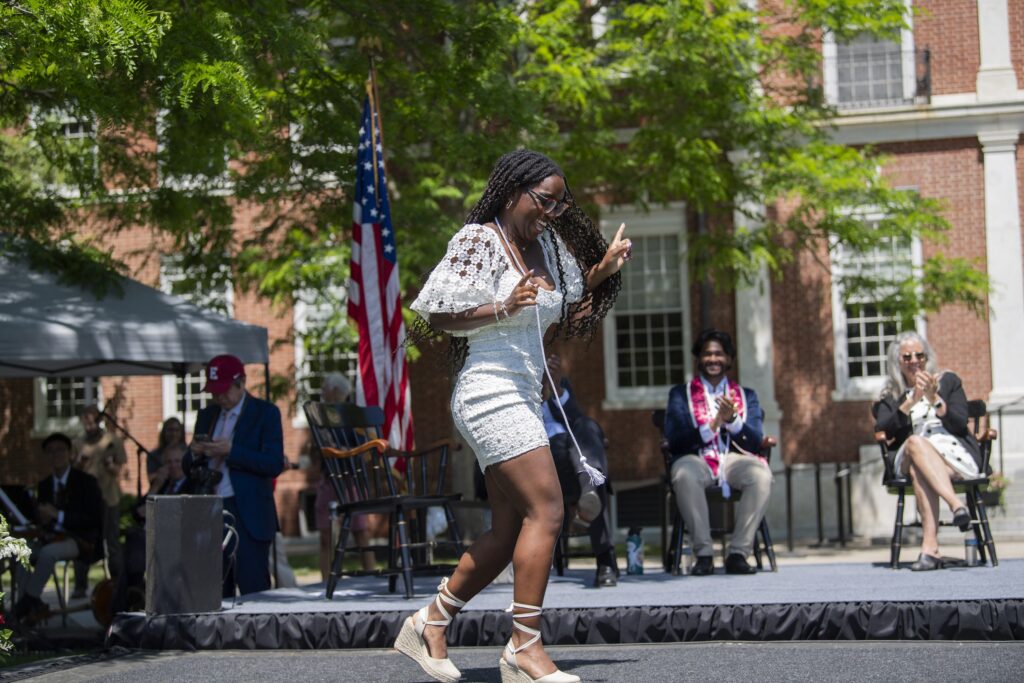
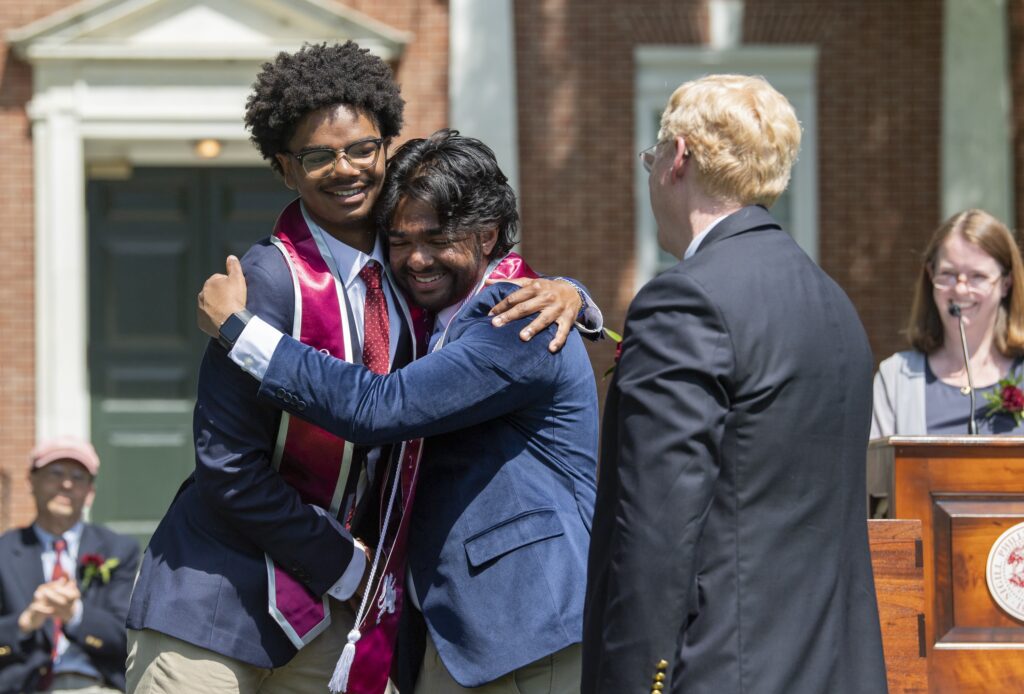
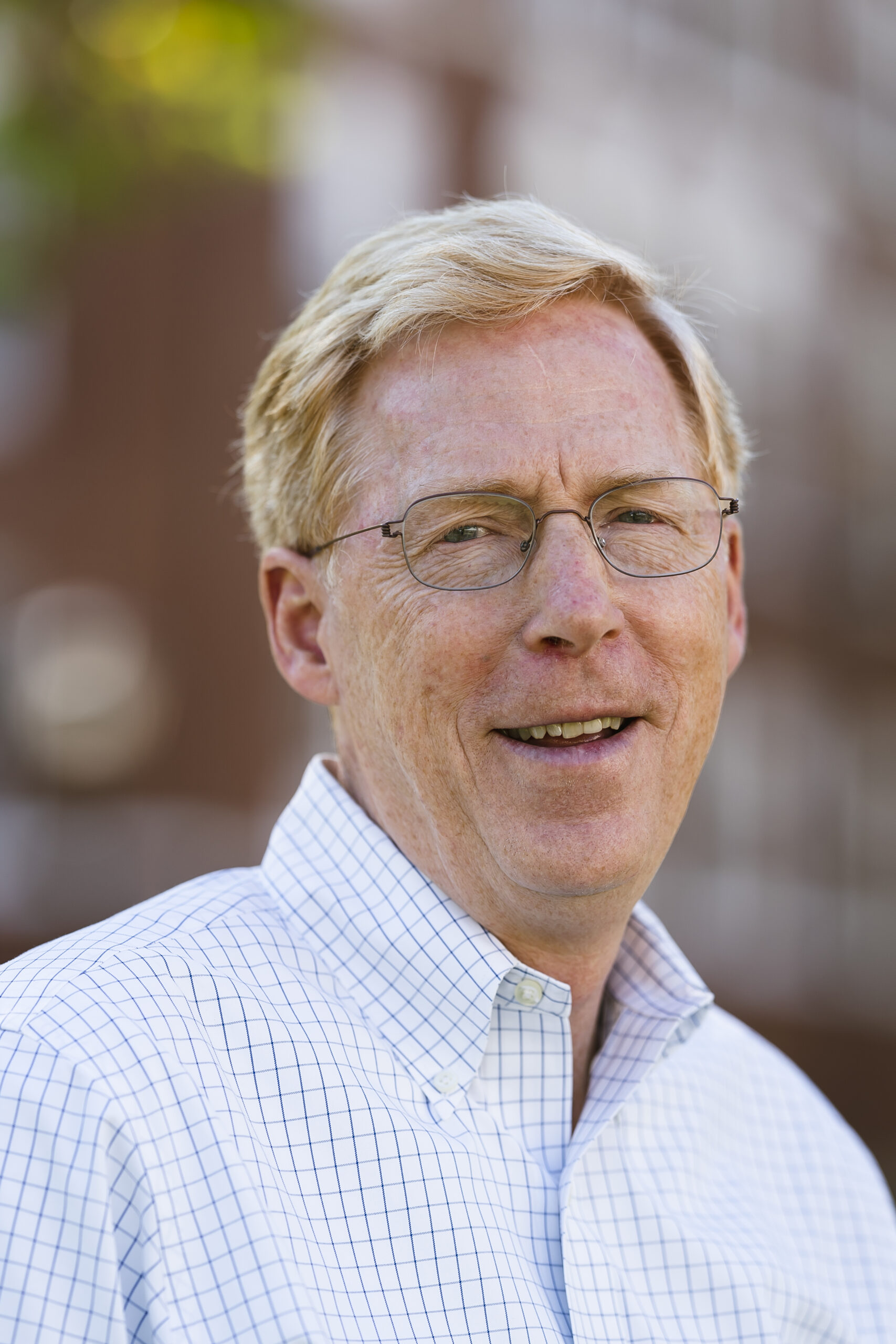
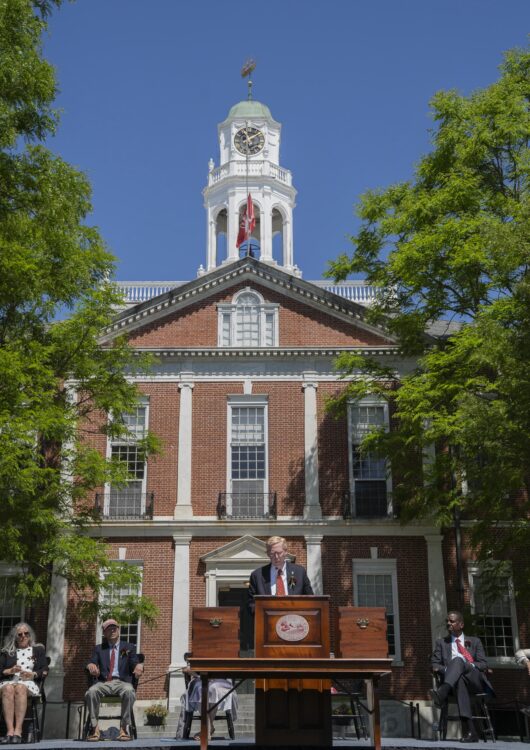
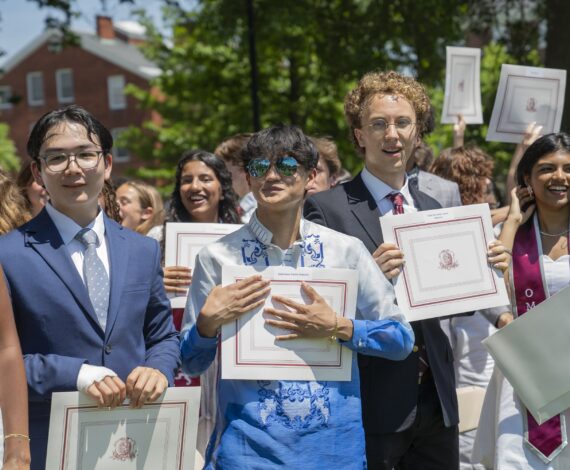
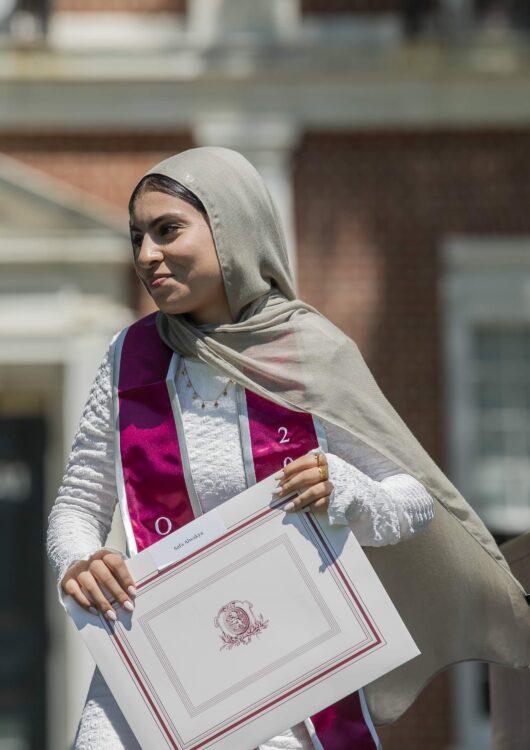

It was the paper as much as anything that really just lit me up,” Tiffanie Turner ’88 says of the Italian crepe paper that inspired her to begin making craft flowers in 2013. At the time, she was a practicing architect raising two young children and in search of materials to make a flower crown for a dance class she was taking in San Francisco. Discovering the delicate paper was a creative awakening.
“I started having epiphany after epiphany,” she says. “‘What if I built a big, peony-shaped piñata?’ Then I thought, ‘What if I hang this peony on the wall, and don’t bash it with a bat?’”
Turner had spent 15 years as an architect after graduating from Rensselaer Polytechnic Institute in upstate New York. Prior to that, she attended the Academy, where she studied architecture with Art Instructor Nick Dawson. But now, flowers were all she could think about.
“I don’t think I had really ever given myself permission to be outwardly creative,” Turner says. “At first, making flowers was something to do when the kids were asleep. Then I began to feel that, wow, I could do this every single day for the rest of my life.”

Photo by Aya Brackett
Encouraged by her husband, David, she began applying her engineering skills to a new end: capturing the beauty, intricacy and intrinsic hope found in flowers.
Today, Turner’s dramatic creations adorn walls from coast to coast, including in her dining room in West Marin County, California, and the homes of art collectors and galleries. She has had several solo exhibitions in San Francisco and Massachusetts, and in 2017 published a book of her techniques, The Fine Art of Paper Flowers. She also regularly travels abroad to teach flower-making during residential retreats in France and the U.K.
This past fall, three of Turner’s large, statement-making flower sculptures were part of an exhibit called “GROW” at the Palo Alto Art Center. In one install-ment, two 3-foot-wide pink roses hung on the wall, one freshly budding and one with wilting petals, joined by three blue ribbon bows. Titled Soup to Nuts, it speaks to the stages of marriage over a lifetime, from the fresh, hopeful beginnings to the very end.
Turner says she “uses the accessibility of flowers to invite people in,” then incorporates natural irregularities through decay, wilt, dormancy and death to challenge viewers with ruminations on the human condition, ephemerality or the state of the environment. This creative process begins with a distinct conceptual moment.
“I’ll find a flower that I’m dying to make — some just speak to me,” she says. “Then I think: ‘What do I want to talk about? What does this flower remind me of?’ It’s a superimposition of concept, then flower, sometimes color and then form.”

Photo by Shaun Roberts
Constructed primarily from papier-mâché, wood or metal rods, cardboard and glue, with layers of exotic crepe paper stained or dyed in natural hues, the blooms are arresting. With each petal deftly textured, colored and carefully draped into position, they are nearly indistinguishable from the real thing — but on an enormous scale. Turner emphasizes that the great unseen material in all her pieces is patience. “Each large-scale sculpture takes two to four months of around-the-clock work to complete,” she says. “There’s no immediate gratification in what I do.”
Finding enough time is always a challenge. By securing grants, selling her work and teaching, Turner has been able to afford the time to keep developing her art. In 2021, a $25,000 grant from the Pirkle Jones Fund helped her build a body of work over two and a half years. She named the collection “American Grown,” and mounted a show in the fall of 2023 at her home gallery in San Francisco, Eleanor Harwood. It then moved to Saint Joseph’s Arts Foundation in early 2024. A career milestone, the exhibit explored themes of generational differences and American exceptionalism.
Turner is currently plotting her next exhibit. “Conceptually, I have a lot of ‘old work’ that I still want to do before I can move on to new ideas,” she says. “There is just an unbelievable amount of material to plumb, because there are so many beautiful flowers out there. And so many issues to talk about.”
This article was originally published in the Winter 2025 issue of The Exeter Bulletin.

It’s 8 p.m. on a Monday night in the Phillips Church basement. We greet the assembled group of 45 student listeners with snacks and a positive spirit as we settle in for our “mindful minute,” an intentional activity to center ourselves. As coordinators of the Student Listener Program, we use this biweekly, scheduled meeting time to check in about what’s happening on campus and in the dorms and discuss logistics of an upcoming assembly in which we’ll share information about the role of student listeners on campus. Two seniors, based on their own research and a pre-meeting review with us, then lead a training on the topic of homesickness, complete with a PowerPoint presentation and a Kahoot! exercise to test our knowledge. As the meeting lets out, a few students stay behind to run some hypotheticals by us in an effort to help peers they’re concerned about.
In the face of worry, stress and loneliness, any Exeter student can knock on dorm room doors with the familiar blue signs to talk with a student listener. Rising uppers become listeners through a complex and collaborative process that entails a personal application, faculty recommendation and dorm feedback; trustworthiness, approachability and respect from peers and adults all factor into their selection. Once appointed, student listeners undergo biweekly training throughout the academic year on topics such as anxiety, homesickness, depression, roommate issues, disordered eating, drugs and alcohol, and supporting LGBTQIA+ students. These meetings cover many aspects of the position, including planning events in the dorm and how to appropriately respond to different situations. This dedicated time ensures that listeners are perceived as a “safe outlet” for the dorm as a whole.
It is developmentally appropriate that teenagers when in distress go to peers first, so student listeners are the front-line support networks for students at Exeter. Besides offering private support, they can also connect their peers with appropriate Academy resources. Most issues are kept confidential, unless a student listener believes someone has been harmed or is a danger to oneself or others. Should an issue extend beyond the scope of a peer-to-peer conversation, listeners are trained to reach out to a trusted adult and are supported by on-call counselors at the Lamont Health and Wellness Center, the dean on duty and Campus Safety as needed.
Counseling and Psychological Services collaborates with the Health and Human Development Department to oversee the Student Listener Program. This has been a wonderful partnership, as we weave together our respective disciplines to promote health and wellness on campus. But it’s not strictly business with student listeners, as the students say. We attempt to model living a balanced life. Whether it’s telling jokes, breaking into song or students giving each other shout-outs for their accomplishments in athletics, theater or music, Student Listener meetings have an air of positivity, peace and fun.
On the day of our assembly, we gather onstage in the Assembly Hall, wearing our Student Listener T-shirts. After we speak about our role on campus, we play a short music video of a day in the life of a listener. It’s electric to come together to promote the work we do. As Bruno Mars’ “You Can Count on Me” fills the hall, we hope students take away our guiding principles: When in doubt, reach out. Look for the blue door tag. And never hesitate to knock.
The Student Listener Program started with a handful of listeners in the spring of 1983. Pioneering counselors Jan Eaton, Patty Schwartz and Connie Morse co-founded the program and established many tried-and-true traditions over the years, including the annual fall retreat and community-building dorm events. As Ms. Morse would say, “We do not want students worrying alone about their peers — we want them to reach out to grown-ups and seek help. Many have helped students access help and counseling over the years and have made a big difference in a student’s life by being there in hard times.”
The program has undergone some recent changes, including asking listeners for a two-year commitment to help with continuity and mentorship of younger students. We have also streamlined the number of listeners in each dorm/house to ensure proper supervision and support. Yet our goal and mission have remained the same: to ensure that students feel heard not only in their dorms, but also in the larger school community, and to give students a familiar face and access to whatever they need to unlock their best selves.
Jo Mautz is a licensed clinician and counselor in the Lamont Health and Wellness Center. Brandon Thomas is an instructor in the Health and Human Development Department. Mautz and Thomas coordinate Exeter’s Student Listener Program.
This article was originally published in the Winter 2025 issue of The Exeter Bulletin.
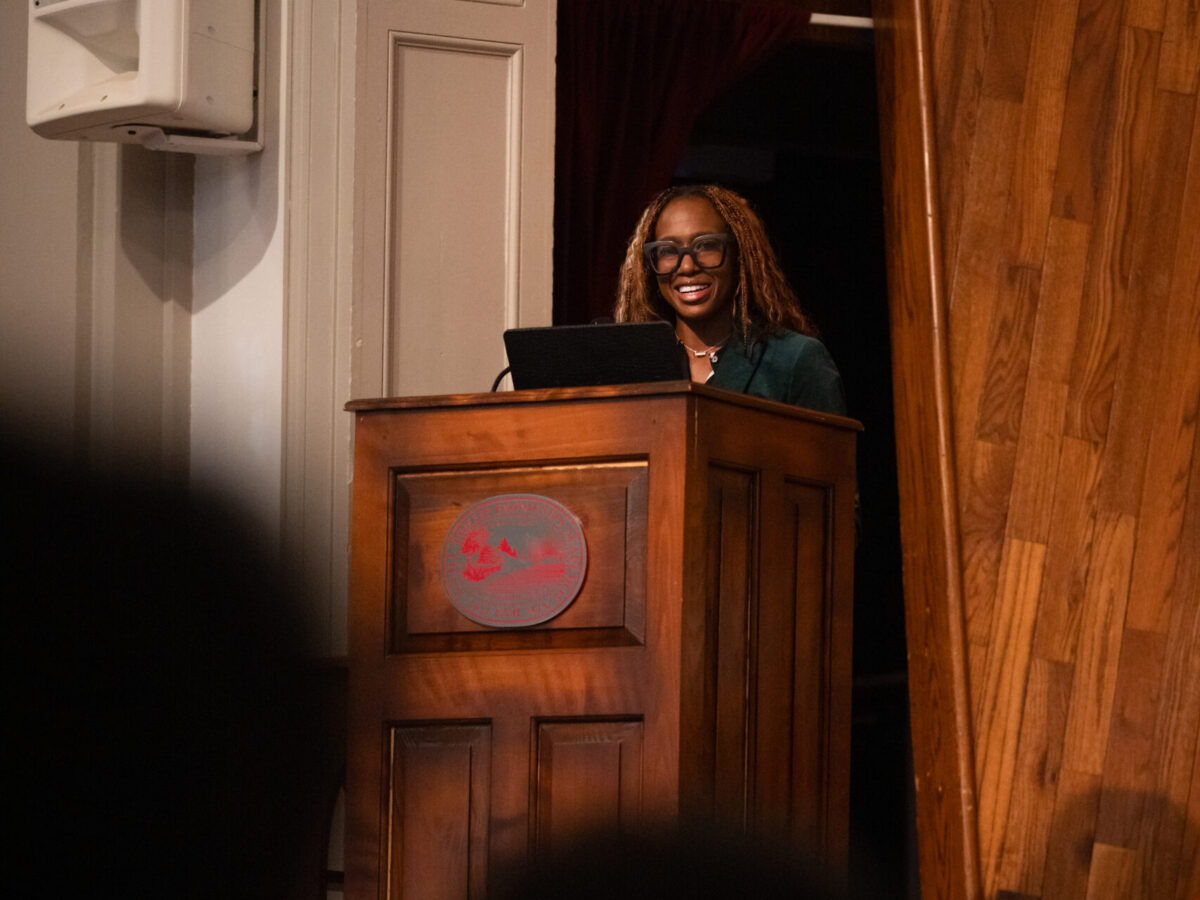
In January 2020, Principal Bill Rawson ’71; P’08 announced the formation of a steering committee tasked with examining connections between Exeter and the institution of slavery. Though the arrival of the COVID-19 pandemic led to some delays, the Committee to Study Slavery and its Legacy at Exeter kicked off its efforts in the fall term of the 2023–24 school year.
Co-led by Director of Equity and Inclusion Stephanie Bramlett and Magee Lawhorn, head of Archives and Special Collections, the committee includes students, faculty, staff and alumni dedicated to reporting on and raising awareness of the Academy’s history and connection with enslaved persons, as well as researching and sharing the stories of early Black Exonians.
Exeter is only one of many educational institutions undertaking similar efforts in recent years. Universities including Brown, Harvard and Georgetown have all launched major initiatives to investigate and confront the various ways in which slavery shaped their histories, and considering how to recognize and reckon with its legacy. This week, Bramlett, Lawhorn and other staff and faculty members on the committee shared some of the results of their ongoing work in a community-wide assembly held during the Core Values Project block.
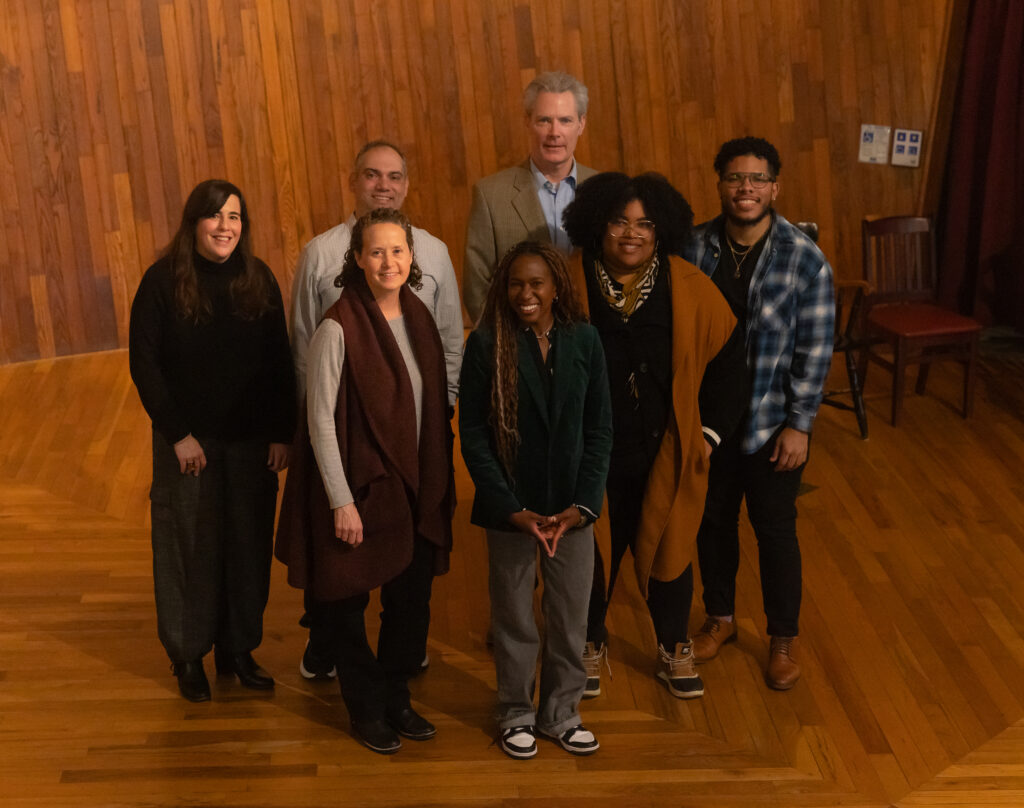
Members of the Committee to Study Slavery and its Legacy at Exeter
Urging students gathered in the Assembly Hall to “seek the stories” connected with Exeter’s past, Bramlett spoke of four individuals who were at one point enslaved by John Phillips, who founded the Academy in 1781 with his second wife, Elizabeth. Phillips inherited three individuals, a man named Robin and two women, Phillis and Dinah, as part of the estate of his first wife, Sarah, who died in 1765. Bramlett shared what information is known about Robin, Phillis and Dinah, as well as another man, Corydon, who was still living at the time of Phillips’s death.
“When John Phillips died in 1795, he was not an enslaver,” Bramlett said. “But he did enslave four people during his lifetime, and I want you to remember their names.”
Other highlights from the committee’s presentation:
Laura Wood, director of the Class of 1945 Library, concluded the assembly by urging the audience to remember the names of those whose stories were shared and to challenge themselves to learn more about those yet untold. “Have conversations and engage with one another,” Wood said. “It’s a full community project, and we hope that it becomes a full community conversation.”
At the conclusion of the assembly, community members headed to Elm Street Dining Hall to enjoy some cake and “ale” (cider) in tribute to Dinah, whose story Bramlett shared in her presentation. One of the women formerly enslaved by John Phillips, Dinah later owned property and operated her own business near today’s Court Street in Exeter, selling similar snacks to the boys attending the Academy.
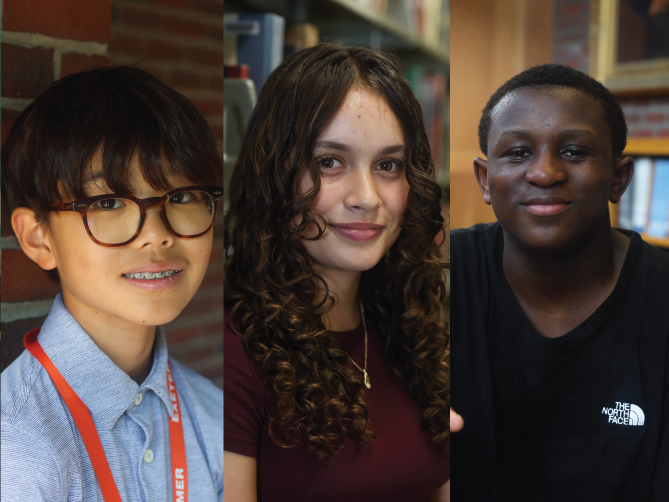
For five weeks last summer, a group of rising 8th and 9th-grade students grappled with big global issues, read classic and modern literature from around the world in translation, and spoke to each other in Russian, Chinese, Japanese and Arabic — all without leaving Exeter’s campus.
These students, who arrived at Exeter from various states and several foreign countries, chose the popular course cluster A Global Community. It’s one of 10 different academic clusters available as part of Access Exeter, the Exeter Summer program aimed at younger students. They took three different classes — Contemporary Global Issues, The World’s Literature and Dipping into Modern Languages — grouped around the theme of preparing students for participation in an increasingly interconnected world. In Dipping into Modern Languages, they spent about a week on each language and culture, including greetings and simple dialogues for everyday situations, conversation and hands-on activities.
Below, three students in the cluster, each hailing from a different region of the United States, talk about their reasons for taking the course, and what their experience was like.
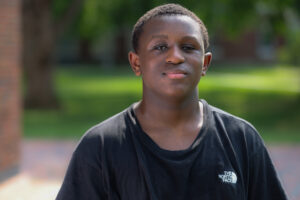
Previous language learning experience: Speaks some Kiswahili at home with his mother, who is from Kenya.
Why did he choose the Global Community cluster? “I wanted to learn more about the issues in the world, and steps towards solutions that we could take.”
Favorite language he studied last summer: “Japanese. The language is really pretty, and it all comes together once you learn a specific pattern [of] how to put the words and then the meaning of each word and character.”

Previous language learning experience: Has studied Spanish in school
What was it like studying four languages in as many weeks? “I was skeptical at first coming in and only practicing one language every week, but I’m really impressed at how much we’ve been able to go over in the five days that we have [for each].”
Favorite thing about Harkness learning in Exeter Summer? “I really enjoyed being able to have conversations with people my age, but they’re actually in-depth important conversations that I’m not often able to have at my own school. Especially in literature, because we’re able to narrow into certain literary aspects of what we read.”

Previous language learning experience: Speaks some Korean at home; has studied Spanish and German
Why did he choose the Global Community cluster? “I thought it would be interesting to study world literature, other modern languages and contemporary global issues.”
One of his favorite moments of the summer: Making a stop-motion film starring a lemon (inspired by the short story “Lemon” by Japanese writer Motojirō Kajii) with other students in his literature class.

Maligned or lauded, pranks are part of Exeter’s history and lore. Over the years, the pranks have ranged from simple to elaborate, and many have involved cars. That was the case in 1957, when a Volkswagen Beetle was parked on the Academy Building stage.
We asked Bob McManus ’57 about the car choice. He guessed, “It was likely the only car in sight that could be carried up stairs and through doorways.” To be clear, McManus was not involved in the prank. But he was a staffer at The Exonian at the time and shared the following article “Students and Faculty Counter-Prank,” the original 8-by-10 photo and the name of the credited Phantom Photog, intrepid photo editor Dick Rudick ’57.
“NOCTURNAL GUEST AND UNUSUAL POSE ON CHAPEL STAGE — The Volkswagen was hoisted on the shoulders of a semi-spon-taneous crew of some 75 upper-class-men, and carried from beside Soule Hall around in back of Abbot, up the path by the Academy Building, through the front door, and up the left-hand stairs leading to Chapel about 9 o’clock Wednesday evening. The advent on the scene of a chance faculty wife, the presence in the building of an evening German class, and the necessity of removing one of the front chapel doors did little to delay the gleeful progress. Over-zealous students hungry for publicity alerted the Boston Herald, which, to confirm the telephone calls, sent its local reporter to investigate the scene. He spoke to the night watchmen, who in turn reported the event to Business Manager Barry, who conferred with Dean Kesler. In less than three hours, a task force of faculty members and wives happily hauled the car back down the right-hand stairs, without removing a door. Evidence of the exodus can still be seen. Mr. Bosetto, owner of the car currently on display in the Maintenance Building, where it is undergoing minor repairs, reported ‘mixed feelings’ Thursday afternoon.”
—From the April 20, 1957, issue of The Exonian student newspaper
This article was originally published in the Fall 2024 issue of The Exeter Bulletin.
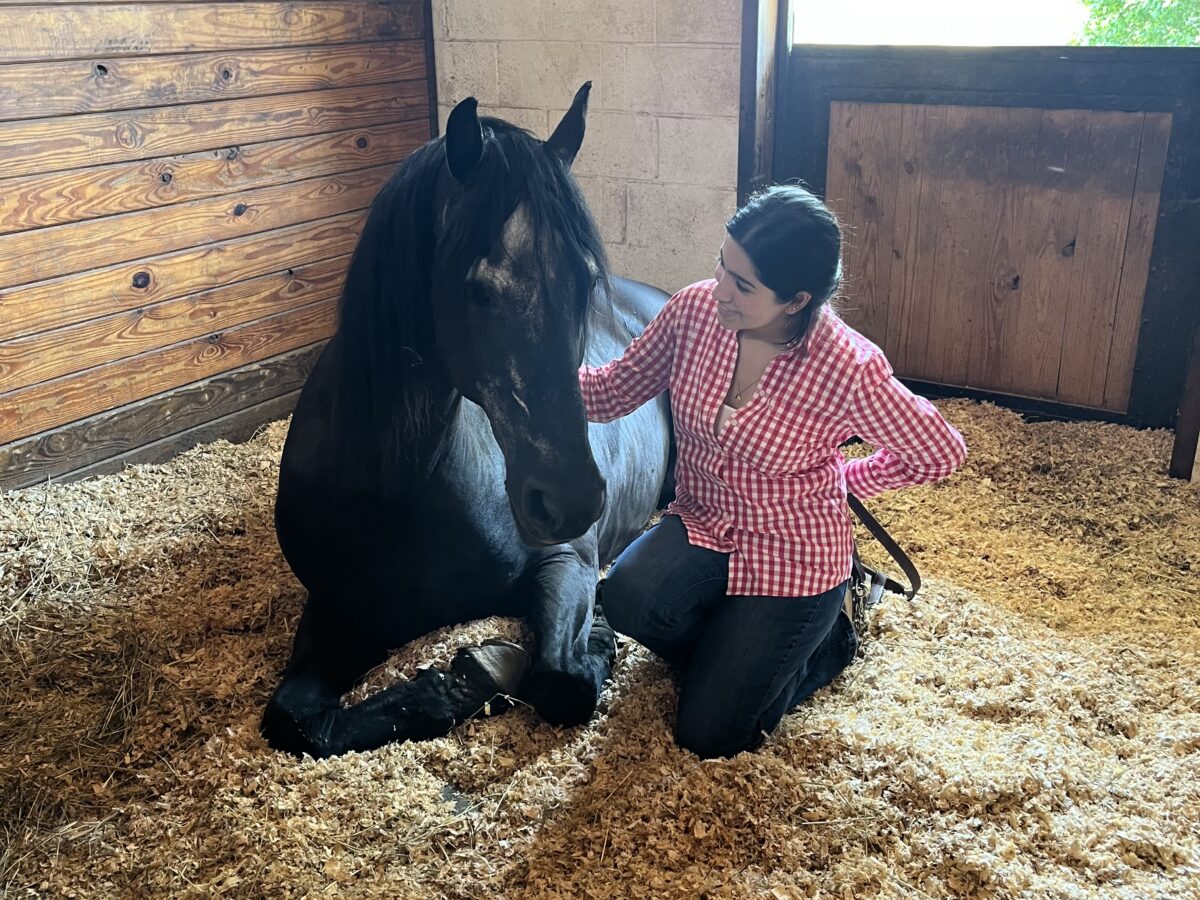
Danixza Pinto ’25 spent three weeks in Coatesville, Pennsylvania, this summer shadowing equine veterinarian Dr. Celia Goodall P’24 as part of Exeter’s mentor-based internship program that pairs students with alumni and parents eager to provide meaningful opportunities. Spearheaded by Instructor in Science Anne Rankin ’92, the program supported 22 students this year in 14 internships in such varied fields as engineering, plastic surgery, ocean health systems science and distressed real estate asset management.
Do you remember your first experience with a horse?
All my life I have been surrounded by horses. My parents grew up on farms. My maternal grandfather was a breeder and trainer for Paso Fino horses. My mom attended several horse shows and competed with her own horse, Jabón. The first time I got on a horse, it was for therapeutic reasons. I was a few months old and rode bareback with only the padding of my diaper, but it was purposeful for the hippotherapy to improve my mobility, motor and cognitive skills. Not only did horses make my first steps and words possible, but they also introduced me to one of my favorite sports.
What drew you to this internship?
Out of appreciation for these outstanding and amorous animals, I’ve always believed it important to learn how to care for them so that I could return the favor. Alongside volunteering for ESSO Equine, a club dedicated to working at an animal rescue, back home in Brooklyn, New York, I have enjoyed working with my local stables to rehabilitate abused horses and provide them emotional comfort. However, I had never had the opportunity to learn how to care for horses’ health. I was thrilled by the opportunity to learn how to properly care for horses’ health and be able to identify and address their needs.
Were the days all work and no play?
Outside of working with Dr. Goodall, I would help her feed the three horses on her property and muck their stalls. During my free time, I had access to ride outside and even had a schooling lesson, so it was very much an immersive and fun experience!
What were your biggest takeaways from the internship?
My initial preconception was that equine vets were primarily for routine or sick visits, similar to that of any health practitioner; however, from the very start, I realized that Dr. Goodall’s job was not as simple as people may think. Notably, most horses we treated were seen for lameness, but the health care did not stop at treating the condition; it continued by improving the quality of life and making the horse more comfortable. It was a very enriching experience to see the impact of regenerative medicine on horses. Horses who were once ill-mannered and demonstrated difficulty at the walk/trot became elated, athletic horses who could finally run free of pain — and the best part is that that was made possible through science!
Did the experience also change how you think?
The other most impactful takeaway from the internship was becoming more open-minded, especially about euthanasia. I had always thought that every horse could be saved or that at least every horse had the right to. Dr. Goodall’s bravery and professionalism taught me a new perspective. Sometimes, the kindest option is also the option that may be very difficult to do, but regardless, quality of life, especially for horses, is of utmost importance.
This article was originally published in the Fall 2024 issue of The Exeter Bulletin.
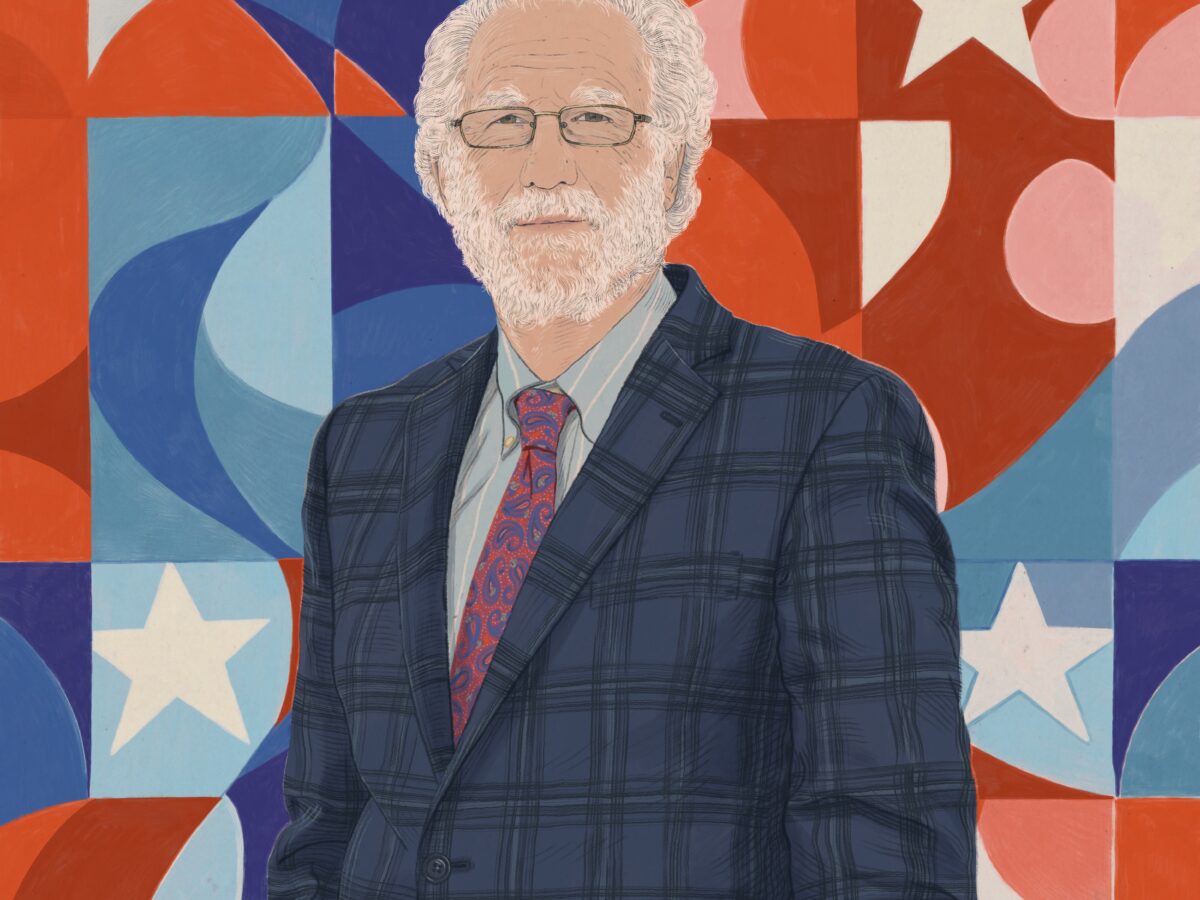
Bob Bauer ’70 is no stranger to political partisanship and controversy. During his 46-year career as an attorney, he has served in various legal roles for Democratic Party organizations and candidates: advising House and Senate Democratic leaders during President Bill Clinton’s impeachment; acting as Barack Obama’s campaign lawyer and White House counsel; and as senior adviser to the Joe Biden presidential campaign on voting rights and election protection. He is a scholar-in-residence at New York University School of Law.
In his latest book, The Unraveling: Reflections on Politics Without Ethics and Democracy in Crisis, Bauer assesses today’s American politics through the lens of his own conflicts and compromises as a political lawyer. He candidly shares moments when he stumbled, contributing to intensifying partisanship, and others when he succeeded in bipartisan conversation, such as with the 2022 Electoral Count Reform Act and recommendation for changes to the Insurrection Act. The Unraveling offers a timely reflection on ways to restore respect and decency to the political arena and strengthen democracy.
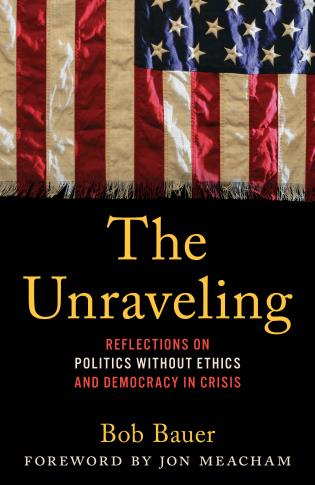
What motivated you to write this book?
I wanted to write about politics as I saw it, addressing as fairly and vitally as I could the state of contemporary American politics. I thought that one way to do that — and also potentially to speak across the aisle at a time that it’s hard to do so — was to review the issues from the perspective of my career and acknowledge my role in the accelerating pull of polarization — the drive to win and the costs of what I term the ‘warrior’ mentality. I wanted to write about ethics as part of participation in the political process. I teach a course at NYU Law about the role of the lawyer in public life. It’s about lawyering and ethics in positions of public responsibility, mostly in government, but some in private life and political campaigns. That’s what shaped my approach to the book.
You describe your work on the Electoral Count Reform Act as one of the most rewarding experiences of your career. Why?
I continue to be very active in Democratic Party politics, but I have tried to create and preserve a space for bipartisan reform work. In the last cycle, working on the Electoral Count Reform Act, an issue that was fraught with partisan tensions, what I found is that there is a way to mark out common ground. I continue to believe that every now and then you can get Democrats and Republicans together, and a conversation that is properly structured can take place, because there is a set of common commitments to the democratic process that you can ultimately appeal to.
You write about your father, an immigrant to this country. How does he inspire you?
He came to the United States embracing the country as a Roosevelt Democrat, but nonetheless, he wanted to hear what other people had to say. He had tremendous faith in dialogue, and in democratic institutions — and he recognized when they could be dangerously under siege. I write in the book that he was a lifelong, fierce antagonist of Richard Nixon. But at the same time, if he had an opportunity to talk to Republicans, hear what they had to say, understand their arguments, he thought that was all a part of what made politics exciting and rewarding, and so extraordinarily valuable. He inculcated that in me, and I wrote about that because both his life experience and also the way he talked about politics brought that home to me very, very forcefully.
You take readers behind the scenes of some of recent history’s most consequential political battles in some wonderful anecdotes. Do you have a favorite?
With some of the stories about Presidents Obama and Biden, I wanted to give some flavor of how organizational integrity ultimately depends on not just rules or even ethical norms. It depends on, if you will, vibes: the culture that leaders establish, and how they handle these issues. There’s only so much you can do to make ethical prescriptions have the bite that you would like them to have. They have some guidance value, but beyond that, what you really want are people in positions of responsibility who are communicating their commitment to ethical politics by their actions, by how they speak, by their fidelity to truthfulness in the communications and interactions with other people. They set the tone, and that tone is what’s so powerful. If you have people at the top who want you to think hard about these issues and make the right calls, that is going to spread throughout the entire organization. It’s going to affect the younger lawyers; it’s tremendous training for younger lawyers.
You’ve served clients in the highest offices in America. How did your time at Exeter serve you in those roles?
I benefited enormously from having Jack Herney as a history instructor. Another significant influence was English Instructor Charles Terry, whom I just thought the world of. When we talked about responses that we had to works of literature, we wound up talking about fundamental moral issues — how we might think about the moral implications of choices that the authors made, or the choices the authors depicted that the characters made. It was a deeply unique, ethically rich mode of instruction. There’s no question that those early experiences, more subsequently than the ones I had in college and law school, had a really significant effect on how I think about issues of common concern.
What’s the most important lesson you’d like your book to impart?
A couple of years ago, I spoke to the assembly at Exeter about my years of politics, and one of the things that I talked about was the importance of, under these kinds of pressures — and they are enormous pressures and strains on the society, strains on the democracy — the importance of still embracing a degree of humility and an openness to conversation. We have to adopt an ethic that puts us at the table with people we strongly disagree with, and learn both how to listen and also how to persuade. A very good friend of mine, also class of ’70, who lived down the hall from me at Exeter, Bob Gerrard, once said: “Don’t argue. Persuade.” And I mentioned that to the assembly: “Don’t argue. Persuade. Listen — and then try to be persuasive.” When I do my nonprofit work around the country on elections and I sit in the room with Republicans and election officials, those conversations are conversations in which it is really important for me to hear what they have to say, with the understanding that they will also listen to what I have to say. What is needed is a conversation and not a confrontation.
This article was originally published in the Fall 2024 issue of The Exeter Bulletin.
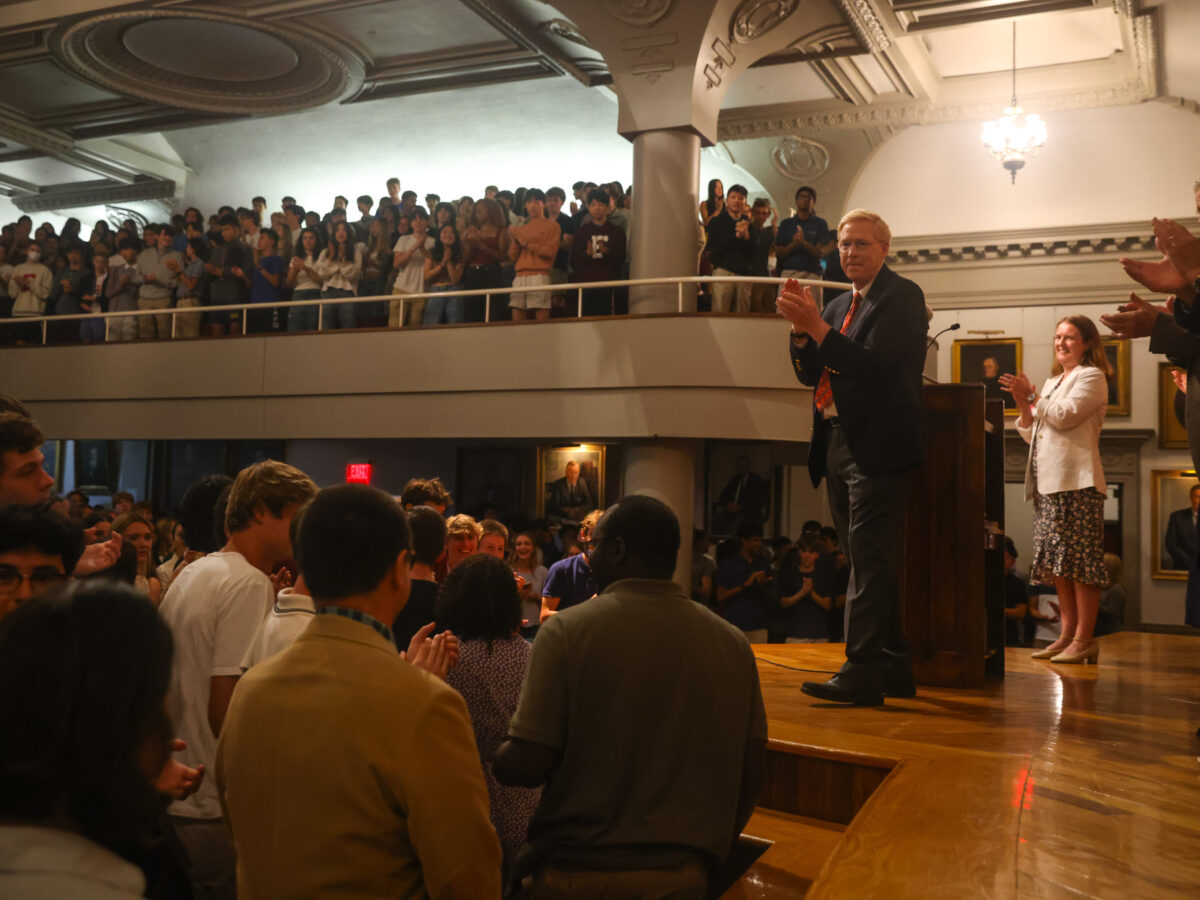
Just over 1,100 Exeter students and several generations of faculty members gathered in the Assembly Hall on Friday to celebrate the opening of the Academy’s 244th school year.
The program began with a procession of current faculty members into the Assembly Hall, to enthusiastic applause from the student body. Adorning the stage were flags from some of the many countries represented in the student body, as well as the Cherokee Nation, Haudenosaunee Confederacy, Osage and United Sioux Tribes.
Principal Bill Rawson ’71; P’08 was joined on stage by Dean of Faculty Eimer Page and a number of Exeter’s new faculty members — including new Dean of Students Ashley Taylor — longest-serving instructors, and emeriti faculty members. After Page introduced this multi-generational group, Rawson began his remarks by welcoming the 369 new students beginning their Exeter journeys, who come from 31 states and 28 countries.
“I like to tell our new students what I would have appreciated hearing as a new lower,” Rawson said. “You can do the work. You will make lifelong friends. Absolutely, you belong here.”
After reading from the school’s Deed of Gift, according to opening assembly tradition, Rawson reflected on the goals of the school’s founders when they signed that document in 1781. “In essence, John and Elizabeth Phillips were saying that your time here matters,” he said. “It matters to your personal development as human beings, and it matters to the world, because the education you receive here will provide the foundation for your purposeful lives.”
Rawson continued by sharing three goals of his own, both for the students and the school, during the coming academic year. The first, he said, was simply for students to have fun.
“I want you to find joy in knowing that you belong here, in discovering that there are other students here with similar interests and passions, and in building lasting friendships with students who initially might seem very different from you,” he said. “Having fun does not mean you will not work hard… . As you rise to the challenges that come your way, you will begin to understand your capacity to meet those challenges.”
Rawson said his second goal was for students to “embrace fully our commitment at Exeter to seeking complex truths,” a concept outlined in the school’s core value statement of academic excellence.
“The learning we seek at Exeter starts with being open to different points of view,” he said. “It requires listening to other perspectives with empathy, humility and respect, and with the understanding that learning at Exeter is a collaborative process.”
Finally, Rawson urged students to begin the year with gratitude. “It is an extraordinary privilege to be part of this community,” he said. “I hope you will always be grateful to your teachers and all the other adults, here and at home, who support you during your time at Exeter.”
After Rawson concluded his opening assembly remarks with the traditional words “Senior Class,” younger students and faculty remained seated (also according to tradition) as the Class of 2025 rose and exited the Assembly Hall.
Parents, family members and friends of the Class of 2024 gathered in force along with Exeter faculty members on a brilliantly sunny Sunday to send off the graduates in grand style.
Accompanied by the elegant strains of a student string quartet, the seniors made their way across Front Street and proceeded up the center of the lawn, followed by faculty members. After Principal Bill Rawson ’71; P’08 kicked off the ceremony, Senior Class President Ayaan Akhtar welcomed family and friends, as well as his fellow seniors.
“Congratulations — we made it,” Akhtar told his classmates. He mentioned challenges they worked through together during their time at Exeter, including beginning their ninth grade fall in September 2020, deep into the COVID-19 pandemic.
“We attended our first-ever classes scattered across the globe, staring blankly at a Zoom screen,” Akhtar said. “We lacked the instant physical connection every other prep class made as soon as they stepped foot on campus during orientation, yet we brought passion and an overwhelming desire to learn and love one another.”


Akhtar briefly paused his remarks in honor of classmate Matthew Clemson, who died last year. “Our class is incomplete without his presence,” Akhtar said. “He brought in irreplaceable light.” He also mentioned world events, including the effects of climate change and ongoing conflicts in Ukraine, Sudan and Gaza, among other regions.
“Transitioning into adulthood brings a rising responsibility to use our education to recognize global adversity and its intersectionality,” he said. “Education truly is an extraordinary gift and an extraordinary luxury we have all been afforded, so it’s on us to use this gift as we become adults in a world full of injustices.”
Akhtar ended with a message of “hope and promise” for himself and his fellow graduates. “Let us continue to imagine, to dream — let us utilize our immense curiosity and ability to envision and create a better world.”
After Akhtar’s remarks, Rawson recognized five retiring faculty members who he said represent a combined 162 years of service to the Academy. Michelle Dionne, instructor in the English Department (appointed in 1996); Mark Hiza, instructor in the Science Department (appointed in 1993); Becky Moore, instructor in the English Department (appointed in 1990); and Russell Weatherspoon, dean of students and instructor in the Religion Department (appointed in 1987), were sitting onstage during graduation. Dana Barbin, former athletic director and longtime varsity boys’ hockey coach who was appointed in 1987, also retired this year.

“You came to Exeter to learn and grow, have fun, make lifelong friends, pursue your passions, and lay the surest foundation for the rest of your lives — the surest foundation for leading purposeful lives,” Rawson said at the outset of his farewell address to the Class of 2024. “You have done all that, and you have done it well.”
Like Akhtar, Rawson spoke of the challenges many members of the class had faced together. “I am proud of all that you have accomplished, but even more proud of how you have contributed to the life of the school, and how you have supported each other,” the principal said.
Rawson also discussed the impact of world events on the school community, and the toll taken by daily news reports of “war, violence, disease, hunger, poverty and injustice.” “You have to decide how you want to respond to these and other challenges that you see in the world every day,” he told the graduates. “You have to decide how you want to make the world, the communities in which you live, and the places where you work, better than you found them — not just for some, but for all.”
Crucial to that effort, he emphasized, would be not surrounding themselves with people of similar opinions and outlooks, but seeking to continue learning “with and from others whose ideas, experiences and perspectives differ from your own.”
During their time at Exeter, Rawson said, the seniors heard many alumni speak from the Assembly Hall stage and elsewhere about their experiences applying the core values learned at Exeter in work and life. With graduation, they join that community of Exonians seeking to bring the values of goodness and knowledge to bear on some of the world’s greatest challenges.
“It is your turn now to begin writing your own non sibi stories,” Rawson said. In closing, he welcomed the Class of 2024 into the family of Exeter alumni, assuring them that “You will always be Exonians, and you will always belong here.”
Before Rawson’s remarks, Dean of Faculty Eimer Page P’22, Akhtar and retiring Trustee Wole Coaxum ’88; P’24 presented this year’s endowed college scholarships, followed by the commencement awards and prizes.
The Faculty Prize for Academic Excellence: Jack Gordon
The Cox Medals: Beeke Fock, Jack Gordon, Daria Ivanova, Emi Levine, Luca Shakoori
The Yale Cup: Byron Grevious
The Ruth and Paul Sadler ’23 Cup: Caroline Shu
The Perry Cup: Nhan Phan
The Williams Cup: Achyuta Rajaram
The Eskie Clark Award: Adora Perry
The Thomas H. Cornell Award: Gretchen (Gigi) Lannon
The Multicultural Leadership Prize: Solu Ajene, Ayaan Akhtar, Stacy Chen, Aliyana Koch-Manzur, Emelia (Emmie) Zarb
A string quartet consisting of Jaehyun Park ’24, and Ethan Ding ’25 on the violin, Evan Fan ’26 on the viola and Luke Miller ’24 on the cello, played the prelude and processional at the beginning of the ceremony.
After the presentation of honors and special awards, Music Instructor Jerome Walker led a performance of “The Road Home,” composed by Stephen Paulus, by seniors in Exeter’s Concert Choir, including Vera Aimunmondion, Nupur Malhotra, Riya Tyagi, Rodrigo Camara Moreno, Colin Maloney, Ellie Wang, David Goodall, Silja Pope, William Weber, Anna Hanzíková, Christopher Serrao, Corinne Wingate, Ava Lori Hudgins, Aidan Ting and Chengyue Zhang.
Seniors Willa Bazos, Elizabeth Catizone, Nataly Delcid and Nihaal Rana assisted Rawson in handing out the diplomas, while Class Marshals Corinne Blaise, Reid Burke, Lucas Rodriguez and Diego Shetreet escorted their fellow members of the Class of 2024 to their seats before the ceremony.



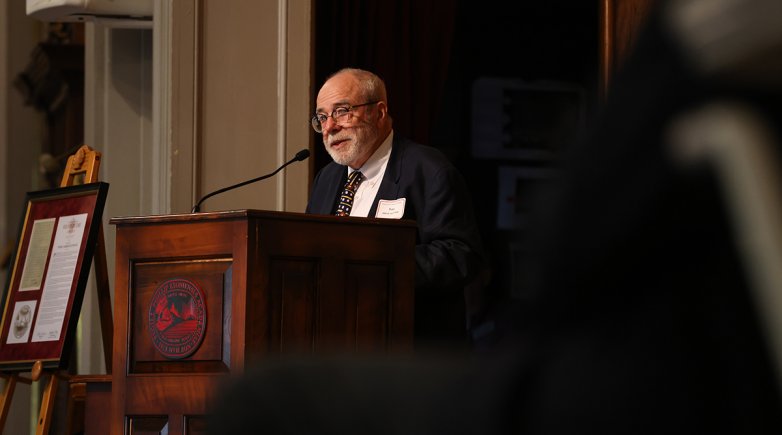
First as a student, and later as a dedicated alumni volunteer and parent to two Exonians, Peter Aldrich ’62; P’99, P’03 has made his mark on the Academy over more than six decades. Yet perhaps nowhere was his impact more felt than on Exeter’s buildings and grounds, the responsible maintenance of which he championed during a decade of service on the Trustees, from 1987 to 1997.
“As a trustee, you applied your intellect, curiosity and boundless energy to the vital task of preserving Exeter’s buildings for future generations of students and faculty,” Betsy Fleming ’86, president of the General Alumni Association, said when presenting Aldrich with the 2024 Founders’ Day Award in front of an audience of students, faculty, alumni and Trustees in the Assembly Hall.
Established by the Trustees in 1976 — and renamed in 2019 to honor the role of both John and Elizabeth Phillips in the school’s formation — the Founders’ Day Award is given annually in recognition of longtime service to the Academy. Six former winners sat on the stage with Principal Bill Rawson ’71; P’08 and Exeter’s current Trustees to watch Aldrich accept the award: Kendra Stearns O’Donnell ’31, ’47, ’63,’91, ’97 (Hon.); P’00; Rick Mahoney ’61; ’74, ’95 (Hon.); P’88, P’92; David Bohn ’57; P’81, P’84, P’90; Jim Theisen ’40, ’45, ’52, ’66 (Hon.); P’97; Alan Jones ’72; and Rich Aaronian 76, ’78, ’97 (Hon.); P’94, P’97.
Fleming spoke of how Aldrich began his service to the school in the 1970s, serving on the Long Step Forward capital campaign, among other roles. To his role as trustee and chair of the Buildings and Ground Committee, he brought knowledge drawn from his own experiences founding and running businesses, especially the real estate investment advisory AEW Capital Management.
“You noted the amount of deferred maintenance on Exeter’s hundreds of buildings, including leaking roofs and crumbling foundations, and helped implement the comprehensive facilities assessment procedure the school uses today,” Fleming said.
With Aldrich’s guidance, she explained, the Trustees also embraced his motto of “no net new space,” meaning that for every new building that was built on campus an equivalent amount of square footage must be decommissioned. They also ratified a funding policy for capital projects dictating that funds raised for every new building must cover 130% of the cost, ensuring the maintenance of the building in the years to come.
In accepting the Founders’ Day Award, Aldrich spoke of his fortunate upbringing in a large, affluent family in Wellesley, Massachusetts, and his longstanding desire to prove himself worthy of the privilege he’d been afforded. “I knew I had to earn the many advantages I had,” he told the audience in Assembly Hall.
At Exeter, that feeling led him to establish the school’s Peace Corps Program in 1961, inspired by John F. Kennedy’s challenge to college students to live and work in developing countries. He served in the Peace Corps after graduating from Harvard, living abroad in the Philippines. At Harvard Business School, he embraced an entrepreneurial drive, and founded his first business shortly afterward. When that first business failed a few years in, he said, he embarked on a cross-country motorcycle trip with his wife, Widgie, who was in the audience along with a number of Aldrich’s friends and family members.
“It ultimately came to me that the most important thing in life for me was relationships,” Aldrich said. “I had a new perspective when I came back from that camping trip.”
Despite the eventual success of AEW Capital Management and other ventures, Aldrich emphasized the number of times he had failed over the course of his career. He used these experiences to offer some words of wisdom to the younger Exonians in the audience, particularly members of the Class of 2024.
“If you don’t have failures, if you’re just rocketing through life with everything going well, someday you’re going to meet a real crisis and it’ll be hard for you,” he said. “But if you have failed and think about it and try to learn from it, I think you’ll be just fine.”